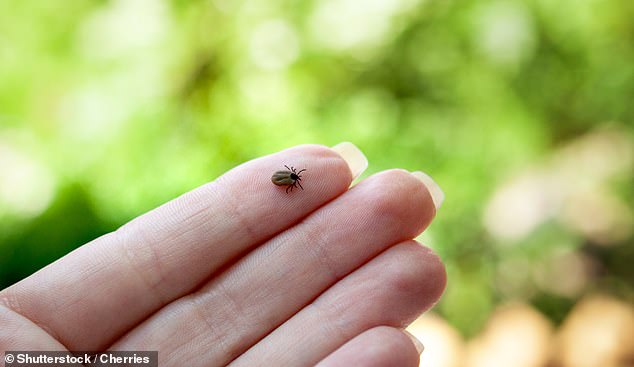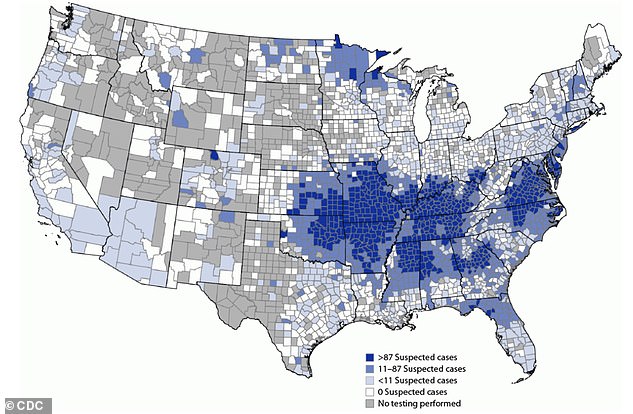A sudden and unexpected death in New Jersey has now been identified as the first documented fatality caused by a rare tick-bite complication that is becoming more common.
The case, published in the Journal of Allergy and Clinical Immunology: In Practice, sheds new light on alpha-gal syndrome (AGS), a little-known, but rapidly emerging, health threat that causes the sudden onset of a meat allergy triggered by certain tick bites.
In the summer of 2024, a 47-year-old unnamed father and airline pilot collapsed in the bathroom of his home and died despite prolonged resuscitation efforts.
An autopsy found no cardiac, neurological, or respiratory abnormalities, and the death was initially labeled ‘sudden and unexplained.’
Seeking answers, his widow asked a friend, pediatrician Dr Erin McFeely, to review the report.
McFeely then contacted Dr Thomas Platts-Mills, a University of Virginia allergist who first linked tick bites to red-meat allergy nearly two decades ago.
Alpha-gal syndrome is triggered when the immune system becomes sensitive to a sugar, alpha-gal, found in the cells of mammals such as cows and pigs.
The allergy is unusual because symptoms appear three to five hours after eating meat, often waking patients from sleep with severe stomach pain, vomiting, or what seems like a sudden gastrointestinal illness. The New Jersey man experienced a reaction four hours after eating beef.

A mysterious death in New Jersey has now been identified as the first documented fatality caused by a rare tick-bite complication which is becoming increasingly common (stock image)
Many victims, and many clinicians, do not recognize these episodes as allergic reactions.
The New Jersey man had experienced a similar episode shortly before his death, waking at 2am with intense abdominal pain, vomiting, and diarrhea after a late steak dinner on a family camping trip.
‘I thought I was going to die,’ he told one of his sons afterward. The symptoms resolved, and the family never linked the event to the meal.
During a recent camping trip, the man suffered more than a dozen itchy bites around his ankles, what the family assumed were ‘chiggers,’ but were likely larval lone star ticks.
Lone star ticks are now recognized as the leading cause of alpha-gal sensitization in the US.
The tick species, which is one of around 850 worldwide, has increased and it is expanding into new areas due to factors such as climate change and the rebounding population of their host, the white-tailed deer.
This expansion is notable in US states that were historically not a major part of their range, such as those in the Northeast and Midwest.
The CDC estimates that as many as 450,000 Americans may have alpha-gal syndrome, though only three states formally track cases.
And Platts-Mills believes millions may have been sensitized without realizing it.
In the case he reviews, two weeks after the camping trip, the man ate a hamburger at a barbecue, drank a beer, and spent an hour mowing the lawn.
Four hours later, he began vomiting and collapsed.
His son found him unconscious on the bathroom floor and called 911, but he could not be revived.
With the family’s permission, postmortem blood samples were sent to Platts-Mills’ lab.
Testing showed clinically significant levels of IgE antibodies to alpha-gal and beef.

A map showing the geographic distribution of suspected alpha-gal syndrome cases per 1 million population per year in the US from 2017 to 2022
Additional analysis at the Mayo Clinic revealed postmortem tryptase levels above 2,000 ng/mL, among the highest ever recorded and consistent with fatal anaphylaxis.
The results confirmed the suspicion: the man had died from a severe allergic reaction to red meat, triggered hours after consumption.
Doctors say the case illustrates the challenges of diagnosing AGS.
A 2023 CDC survey found that more than 40 percent of physicians had never heard of the condition.
Because the allergy often presents with isolated abdominal symptoms, many patients never receive a diagnosis and remain at risk.
Researchers warn that the spread of the lone star tick, driven by booming deer populations and shifting climates, means more Americans may unknowingly develop the allergy.
For the man’s family, the findings finally answered a question that an autopsy alone could not.
‘We gave them closure,’ Platts-Mills said. ‘You don’t get it until you know what really happened.’

